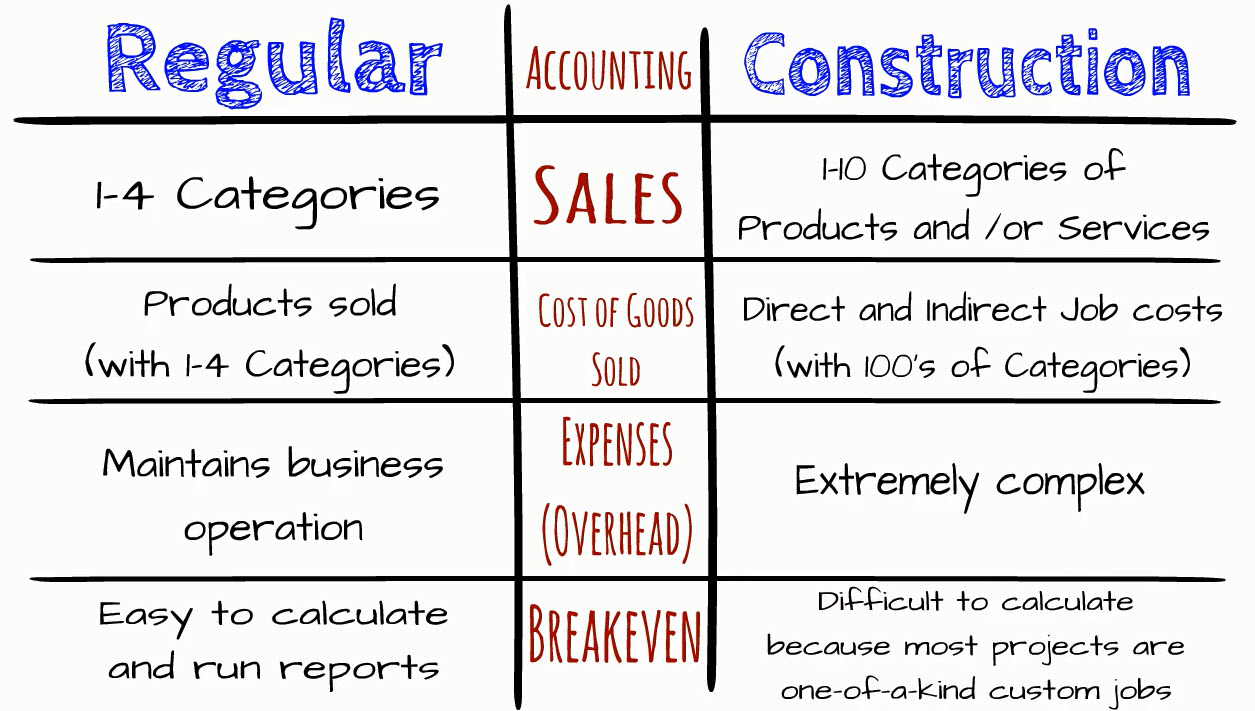Understanding the Role of Construction Accounting in Effective Financial Management
Trick Solutions Offered in Building And Construction Accountancy to Enhance Financial Oversight
In the world of construction accounting, essential services such as job expense estimate, spending plan monitoring, and money circulation evaluation play an essential role in boosting economic oversight. Understanding these nuances can significantly influence the effectiveness of financial oversight in construction projects.
Project Cost Estimation
Effective task price estimate is a critical part of effective building and construction audit solutions, as it straight affects budgeting and financial planning (construction accounting). Exact price price quotes supply a detailed summary of the financial requirements for a construction task, making it possible for stakeholders to make educated decisions regarding source allowance and job feasibility
A comprehensive cost estimate procedure encompasses numerous aspects, including labor, products, devices, overhead, and backups. By assessing historic data and existing market patterns, construction accounting professionals can establish reasonable price quotes that show true task expenses. This logical technique not only help in securing funding however additionally improves openness and responsibility among all events involved.
In addition, accurate cost evaluation acts as a structure for monitoring and managing expenses throughout the task's lifecycle. By establishing a clear standard, construction accounting professionals can recognize inconsistencies in between estimated and real prices, enabling for prompt adjustments and treatments.
Eventually, effective job cost estimate not only facilitates smoother job implementation however likewise reinforces the overall monetary wellness of construction companies, guaranteeing they remain competitive in a progressively vibrant industry. This tactical technique emphasizes the significance of proficient specialists in delivering precise and trustworthy expense quotes.
Spending Plan Monitoring
In the world of construction bookkeeping services, budget plan administration plays an essential duty in making certain that projects remain financially viable and on track. Effective budget plan administration involves the systematic planning, monitoring, and controlling of project prices to straighten with economic purposes. It starts with the production of a thorough spending plan that precisely shows the expected expenses of labor, materials, equipment, and expenses based upon thorough task price estimate.
As soon as the budget plan is established, ongoing monitoring is essential. This consists of normal evaluations of actual expenditures versus the budgeted figures, enabling prompt recognition of inconsistencies. By implementing devices and software program tailored for construction accounting, task managers can create real-time records that help with informed decision-making.
In addition, positive budget monitoring allows stakeholders to adjust economic allotments and resources as needed, promoting adaptability in action to unforeseen obstacles. This adaptability is crucial in the building industry, where job scopes can often change. Eventually, robust budget plan management not only strengthens monetary liability however additionally enhances general project performance, making certain successful conclusion within the allocated monetary criteria.
Capital Evaluation
Capital analysis acts as an essential component of building audit, enabling job supervisors to keep a clear understanding of the inflow and outflow of funds throughout the task lifecycle. This analytical procedure permits the identification of possible money shortages or excess, encouraging managers to make informed choices concerning budgeting and source allowance.
By meticulously tracking cash inflows from client settlements, lendings, and other profits resources, along with monitoring outflows such as labor, materials, and overhead expenses, project managers can create an extensive capital forecast - construction accounting. This forecast not just help in forecasting here are the findings future monetary settings however likewise aids in recognizing fads that might affect job feasibility
Routine capital analysis facilitates prompt interventions, allowing project supervisors to attend to financial challenges prior to they intensify. This positive approach can minimize dangers related to postponed settlements or unforeseen expenses, ultimately resulting in even more effective project conclusions. Moreover, effective capital monitoring adds to maintaining solid relationships with subcontractors and distributors by making sure timely settlements.
Basically, cash money flow evaluation is an important device in building audit, driving financial security and operational effectiveness throughout the period of construction jobs.
Regulatory Conformity Support
Regulative conformity support is necessary for construction firms browsing the facility landscape of industry guidelines and criteria. The construction market undergoes a myriad of local, state, and federal guidelines, consisting of safety requirements, labor legislations, and ecological standards. Non-compliance can result in considerable charges, hold-ups, and reputational damages.
A robust compliance support system assists companies remain educated about relevant guidelines and makes sure that they apply necessary plans and treatments. This includes tracking changes in legislation, offering training for workers, and carrying out normal audits to analyze conformity degrees. Building accountants play a critical duty in this procedure, offering competence to translate guidelines and line up monetary methods appropriately.
Furthermore, regulative compliance support incorporates the prep work and entry of needed paperwork, such as tax filings and reporting for labor standards. By establishing an aggressive conformity method, building firms can mitigate threats linked with non-compliance, improve operational efficiency, and cultivate a society of responsibility.
Ultimately, reliable governing compliance support not just safeguards a building firm's economic health and wellness however also reinforces its track record in the industry, placing it for sustainable growth and success.

Financial Reporting and Insights
While browsing the complexities of the building and construction sector, exact financial reporting and informative analysis are vital for informed decision-making. Building tasks frequently entail significant funding financial investment and fluctuating expenses, making it crucial for stakeholders to have access to prompt and clear economic data. Extensive economic records, including profit and loss statements, capital projections, and balance sheets, supply a photo of a firm's financial health and wellness and efficiency.
In addition, customized insights derived from these reports assistance managers determine fads, analyze task profitability, and make tactical modifications to enhance functional performance. Trick efficiency indications (KPIs) details to construction-- such as project margins, labor costs, and overhead ratios-- offer valuable benchmarks for assessing success and forecasting future performance.
Additionally, regular financial coverage makes it possible for conformity with legal commitments and promotes transparency with stakeholders and financiers. By leveraging advanced accounting software and information analytics, building and construction companies can improve their financial oversight, enabling them to browse unpredictabilities a lot more successfully. Eventually, robust financial coverage and actionable insights encourage building and construction business to make educated decisions that advertise growth and sustainability in a highly affordable market.
Verdict

In the realm of building accounting, key services such as task price evaluation, budget monitoring, and money circulation evaluation play a crucial role in enhancing economic oversight. Eventually, durable budget monitoring not only boosts monetary liability but additionally improves general task performance, making certain successful conclusion within the allocated financial specifications.
